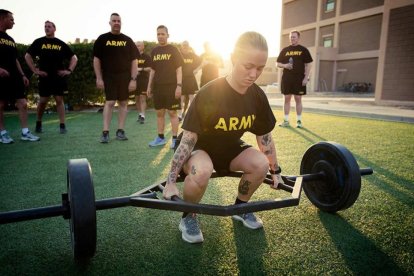Obesity "a dramatic national security problem"
For the first time in history, the Army was unable to fill 15,000 vacancies in 2022, with lack of fitness being one of the main reasons. The number of obese or overweight soldiers is skyrocketing.

(U.S. Army)
Obesity has become a "dramatic national security problem," in the words of retired Marine Corps Brigadier General Stephen Cheney. It is an obstacle that affects both the attainment of new recruits and the fitness of active soldiers, several reports have indicated. In 2022, for the first time in history, 15,000 vacancies remained unfilled in the Army, with lack of physical fitness being one of the main causes. In addition, a second study concluded that 10,000 corps members became obese during the pandemic, bringing the percentage of obese troops to 25% among those studied.
Unfit to serve. by Israel Duro on Scribd
More than $1.5 billion in health care costs
In 2018, the Centers for Disease Control and Prevention (CDC) was already warning that 71% of military-age men were unfit for service. This increased to 77%, according to Pentagon data from last year. Official estimates indicate that obesity causes a significant number of injuries to soldiers, resulting in some 658,000 sick days per year. In addition, obesity-related healthcare costs exceed $1.5 billion annually for current and former service members and their families.
A report by the American Security Project, co-authored by Cheney, charges that "nearly half of the adult population will be living with obesity by 2030. In 2018, almost 33% of those in the 18-25 prime recruiting age bracket were obese, up from a mere 6% in 1978." The retired brigadier general himself pointed out to the AP that these statistics “are only getting worse and worse and worse" since then.
The Recruiting Crisis Obesitys Impact by Israel Duro on Scribd
Obesity jeopardizes Army replacement rate
According to the data analyzed, 77% of men and women of military age would be ineligible for military service. Obesity, at 11%, is the leading reason people would not meet the recruitment requirements. In addition, 44% of young people who present more than one reason for not being able to join the Army or another military corps such as the U.S. Navy or Marines are obese. "It's devastating. We have a dramatic national security problem," Cheney lamented.
According to ASP, the most serious aspect of the recruitment problem is that "as delayed entry program recruits are expedited to fill the current shortfall, the subsequent year’s anticipated recruit pool will shrink further. This creates an even larger gap that compounds year over year. The continuing shortfall will outpace the military’s replacement rate over time, reducing the size of the force significantly and resulting in an inability for the military to remain mission effective across all of its obligations."
COVID-19 pandemic: obesity pandemic
Despite decades of warnings from the military about this growing problem, the situation has continued to worsen year after year. The arrival of the pandemic further aggravated the situation. These were the findings of a study by the Uniformed Services University Health Services Research Center in Bethesda, Maryland, authored and presented by the center's Director Tracey Perez Koehlmoos.
To conduct the study, Koehlmoos and her team tracked the medical records of soldiers before and after the worst of the pandemic had passed. The research excluded soldiers who left at some point during this period and those who entered the army later. Of the nearly 200,000 soldiers who were eventually studied, researchers found that nearly 27% of those who were fit before the pandemic became overweight. In addition, almost 16% of those who were previously overweight became obese. Before the pandemic, about 18% of soldiers were obese; by 2021, that number increased to 23%.
Exercise culture, healthy food and salary incentives or penalties
These are "alarming" figures, according to Cheney, who says that "the country has not addressed obesity as the problem that it really is.” However, Cheney, Koehlmoos and other experts have proposed different ways to address and correct this problem. All agree on the importance of disseminating a culture of exercise and healthy eating to young people through all available means, in addition to increasing access to anti-obesity treatments. Regarding the Army, ASP even proposes offering incentives or financial penalties to soldiers based on their fitness.
RECOMMENDATION





















